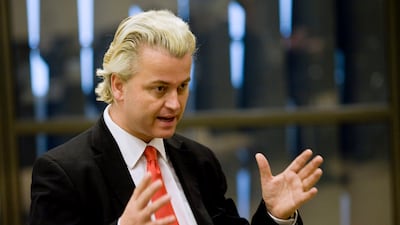The Netherlands has requested an opt-out from the European Union’s rules on asylum as part of a tough new immigration drive.
Writing on X, Asylum and Migration Minister Marjolein Faber said the country had “made history” with the request. “I have just informed the European Commission that I want a migration 'opt-out' on migration matters in Europe for the Netherlands,” wrote Ms Faber, a member of the far-right Freedom Party (PVV) led by Geert Wilders. “We have to handle our own asylum policy once more!” she added.
Under the pact, each EU country is assigned a share – proportional to economy and population – of the total 30,000 asylum seekers that the bloc is expected to take in per year. Countries unwilling to take people in would instead contribute to those that are willing with personnel, equipment or funds.
According to EU data, the Netherlands received two first-time asylum applications per 1,000 residents in 2023, close to the bloc's average. Ten member states had a higher proportion. However, after years of budget cuts, its sole registration centre for asylum seekers is often overwhelmed, occasionally leaving hundreds to sleep outdoors.
Denmark has already managed to negotiate an agreement to keep it outside the EU's common asylum policy. However, the European Commission said “immediate changes” to the Netherlands’ arrangements were unlikely.
“We do not expect any immediate changes under new rules on the side of migration which continue to be binding on the Netherlands,” said Anitta Hipper, a commission spokeswoman for home affairs, migration and internal security. The Dutch coalition government, which took power in July, has been promising the opt-out move for several months, but Mr Wilders has himself admitted that getting such an opt-out could take years.
“A Dutch opt-out can only be realised by amending the treaty,” the Dutch Advisory Council on Migration said, pointing out that all 27 EU member states had to agree to the move. This is not very likely because the number of asylum seekers must then be distributed among fewer other member states,” council members Mark Klaassen and Laura Kok wrote on its website.
“Not every member state will be enthusiastic about this,” they said. No EU treaty change is expected any time soon.
Geert Wilders through the years – in pictures
The country unveiled a new immigration policy on Friday, which Prime Minister Dick Schoof said was in response to an ‘asylum crisis’. We cannot continue to bear the large influx of migrants into our country,” he said.
King Willem-Alexander, in his speech setting out the government's priorities at the opening of parliament on Tuesday, described it as a “faster, stricter and more modest” asylum. NSC acting parliamentary leader Nicolien van Vroonhoven said on Monday that her party would vote for tough immigration measures only if the Council of State advisory body approved it. That led to a furious reaction from Mr Wilders, who posted on X: “the Netherlands has a huge asylum crisis and it will not be solved by running away in advance and threatening … to vote no.”
The request comes after Germany ordered entry checks on its entire land border earlier this month, amid a suspension of free travel under the Schengen zone to curb illegal migration and contain the “acute danger” from extremism. The move was in response to the deaths of three people and wounding of eight others in a stabbing attack claimed by Islamic State at a festival in Solingen.
Checks were already in place at Germany's borders with Austria, Switzerland, Czech Republic and Poland, and for France during the Olympics and Paralympics. But the scheme has now been expanded to Denmark, the Netherlands, Belgium and Luxembourg and will last six months. Countries across the continent are looking to toughen their stance on immigration, including Italy, which has developed a scheme that will see will see Albania – which lies across the Adriatic Sea to the east of Italy – host two holding centres for migrants rescued in Italian waters.
UK Prime Minister Keir Starmer recently said he was interested in the Italian scheme after abandoning the previous Conservative government’s plans to send asylum seekers to Rwanda for processing. Recent analysis from The National has found that more migrants are being packed on to flimsy boats before attempting dangerous Channel crossings to reach the UK.
Boats are now carrying more than 60 migrants, on average, with the number often increasing to more than 70. This has resulted in more deaths being directly linked to overcrowding, with recent reports of migrants being crushed during crossings.













